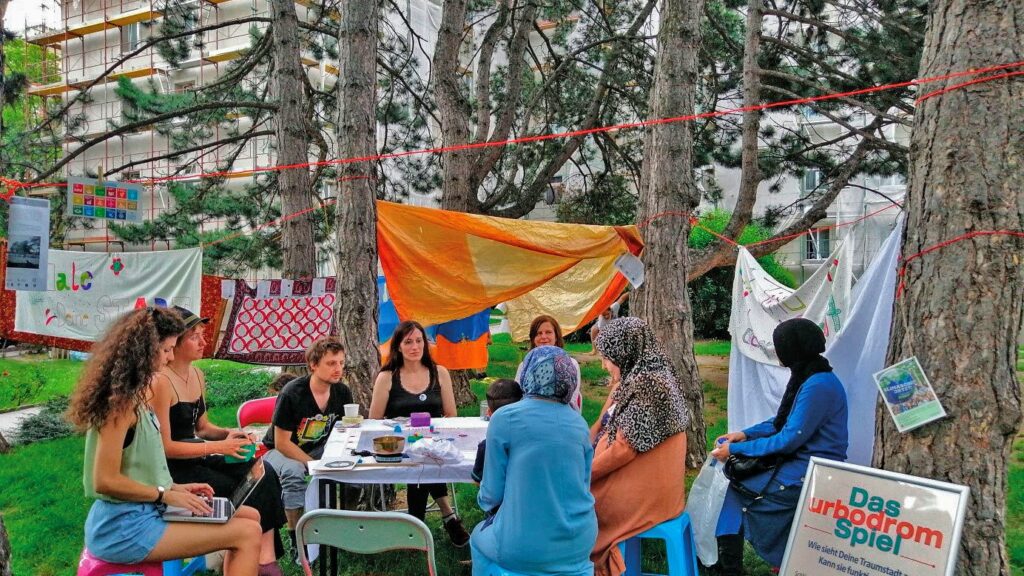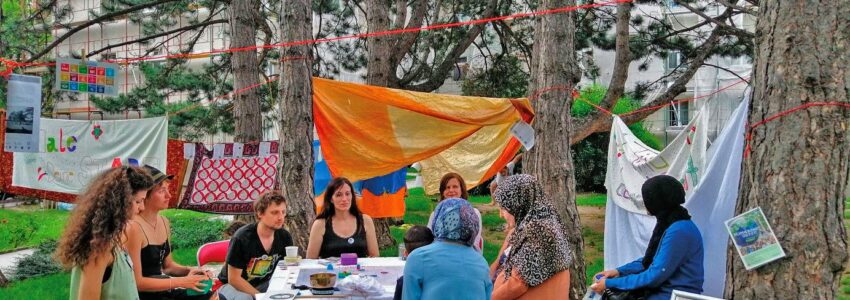02 The Urbodrom game
Urbodrom is an entertaining way to approach the topic of spatial planning and a participation tool for citizens. Round by round, the players build houses, streets and parks and, on the basis of exchange with each other, develop shared ideas inspired by sustainability expertise. It also generates information which can be valuable in qualitative social research.
Prepare
— Develop the narration for your game (what if …) for the specific site / topic / area
— Define 8 – 12 roles, with one object / artefact for each role
— Create the gameboard (a hand drawn sketch on card-board, a large printed map of the area, etc)
Play the game
— Intro: tell the narration, assign roles (each player chooses one role), kick-off the game
— Play: each participant has a go in several rounds, drawing on the board, placing buildings, objects, etc
— Document: Take pictures of the gameboard at each round and document the main statements (audio or notes)
Reflect and analyse
Develop and fill in a reflection grid related to the specific setting and aim.
Benefits
The game values each input and know-how equally. The group benefits from the negotiation experience. As the players find creative solutions together, they become aware of sustainability topics, and a sense of community is created. In this process, talking creates understanding, exchange creates empathy, and this in turn leads to shared ideas.
Urbodrom enables people to express their opinions and wishes about an urban space and to develop shared and sustainability-oriented visions in a playful and creative setting.
Who is it for
Residents, users of a site, urban planners, private companies, politicians etc
How does it work
The players slip into different roles and build
a sustainable urban space together.
Why, what for
It reveals people’s concerns related to space, facilitates the players’ access to political, social and spatial planning topics, and creates a sense of urban commons.
Who can do it and what Do you need for it
Competences: two moderators, ideally with competence in sustainability and urban planning issues
Materials: a game board, modelling clay, props for the roles, table and chairs, thick pens to write and draw
At what phase in a planning process
In the awareness-raising phase
Estimated budget
€ 150 – € 1000, depending on whether you create your own version or get support from the Urbodrom team
syncity Contact
Laura Lohmann, Charlotte Fleischmann,
urbodrom(at)gmail.com, office(at)oikodrom.org

Further reading:
Dumit, Joseph. 2021. ‘Playing with Method: Game Design as Ethnographic Research’. Huberlin website. Retrieved 17 January 2021 from https://www.euroethno.huberlin.de/de/forschung/labore/stadt.
*
Flanagan, Mary. 2009. Critical play: Radical game design. Cambridge and London: MIT press.
*
Law, John and John Urry. 2004. ‘Enacting the Social’. Economy and Society 33(3): 390-410.

